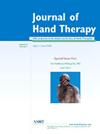The online version of an evidence-based hand exercise programme for people with rheumatoid arthritis: An effectiveness-implementation study
IF 2.1
4区 医学
Q2 ORTHOPEDICS
引用次数: 0
Abstract
Background
The Strengthening and Stretching for Rheumatoid Arthritis of the Hand (SARAH) program is an evidence-based exercise program for adults with hand function difficulties due to rheumatoid arthritis. A self-guided online version of the program has been developed for direct access by patients.
Purpose
To evaluate the delivery of the online program in routine therapy care and its impact on clinical outcomes, before making it widely available.
Study Design
An effectiveness-implementation study.
Methods
Volunteer patients were identified from National Health Service (NHS) hand therapy departments in the United Kingdom. Patients were given access to the 4-week program, delivered via text, videos, polls, and social discussion forums. Self-reported pain and hand function were collected at baseline, discharge, and telephone follow-up at 4 months. Delivery of baseline and discharge sessions, acceptability, and patient engagement and experience were also explored.
Results
A total of 78 patients were enrolled from 18 therapy departments in 15 NHS trusts in England, Scotland, and Wales. Sixty-five patients took part, of whom 46 (71%) registered with the online SARAH program. The majority of baseline and discharge sessions were delivered face-to-face. Pain improved at discharge and was stable at follow-up. Hand function significantly improved with medium effect sizes of Cohen’s d of 0.6 and 0.52 respectively. The majority of patients rated themselves as improved and were continuing the SARAH exercises at discharge and 4 months. No related adverse effects were reported. Patient engagement was high during the first week of the program but gradually declined. Most patients were satisfied and found the program useful.
Conclusions
The online SARAH program delivered in routine therapy care was acceptable and beneficial to patients. Improvements in clinical outcomes were similar to the SARAH clinical trial and our previous implementation work.
类风湿性关节炎患者循证手部锻炼计划的在线版本:一项有效性实施研究。
背景:手部类风湿关节炎的强化和伸展(SARAH)项目是针对因类风湿关节炎导致手功能困难的成年人的循证锻炼项目。该程序的自我指导在线版本已经开发出来,供患者直接访问。目的:评估在线程序在常规治疗护理中的交付及其对临床结果的影响,然后将其广泛使用。研究设计:有效性-实施研究。方法:从英国国家卫生服务(NHS)手部治疗部门确定志愿者患者。患者可以通过文本、视频、民意调查和社会论坛参与为期四周的项目。在基线、出院和4个月电话随访时收集自我报告的疼痛和手功能。基线和出院期的交付、可接受性、患者参与和经验也进行了探讨。结果:共有78名患者从英格兰、苏格兰和威尔士的15个NHS信托机构的18个治疗部门入组。65名患者参与,其中46名(71%)注册了在线SARAH项目。大多数基线和出院会议都是面对面进行的。出院时疼痛改善,随访时疼痛稳定。手功能显著改善,Cohen's d的中等效应量分别为0.6和0.52。大多数患者认为自己有所改善,并在出院和4个月时继续进行SARAH练习。没有相关的不良反应报告。在项目的第一周,患者的参与度很高,但逐渐下降。大多数病人都很满意,并且觉得这个项目很有用。结论:在常规治疗护理中提供的在线SARAH方案是可接受的,并且对患者有益。临床结果的改善与SARAH临床试验和我们之前的实施工作相似。
本文章由计算机程序翻译,如有差异,请以英文原文为准。
求助全文
约1分钟内获得全文
求助全文
来源期刊

Journal of Hand Therapy
医学-外科
CiteScore
3.50
自引率
10.00%
发文量
65
审稿时长
19.2 weeks
期刊介绍:
The Journal of Hand Therapy is designed for hand therapists, occupational and physical therapists, and other hand specialists involved in the rehabilitation of disabling hand problems. The Journal functions as a source of education and information by publishing scientific and clinical articles. Regular features include original reports, clinical reviews, case studies, editorials, and book reviews.
 求助内容:
求助内容: 应助结果提醒方式:
应助结果提醒方式:


